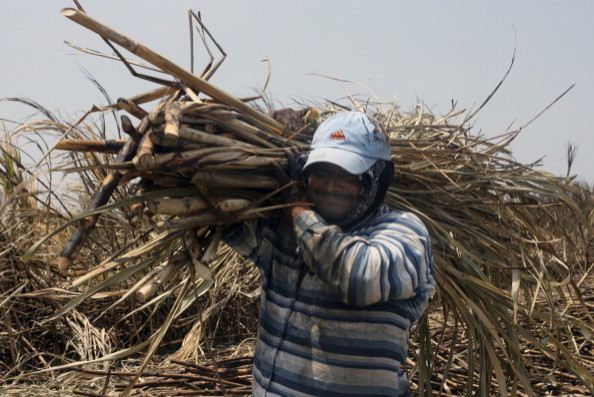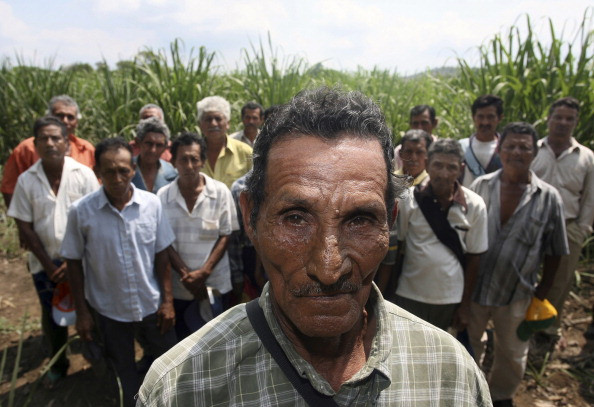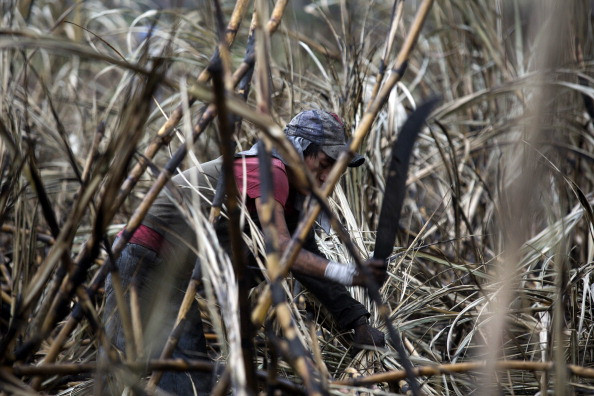Kidney disease epidemic: Thousands of sugar cane workers will die 'if work conditions not improved'

At least 20,000 sugar cane workers in Nicaragua and El Salvador have died in the past two decades due to kidney failure, suggesting that there is a link between their jobs and the widespread Chronic Kidney Disease (CKD).
Deaths due to kidney failure are attributed by the Nicaraguan and other governments in Central America to a high consumption of alcohol, diabetes or hypertension.
However, a February 2015 study by Boston University showed a connection between the disease and the work carried out by the victims.
The researchers analysed medical records from 284 Nicaraguan sugar cane workers and concluded that their kidney function declined during the six-month harvest season and varied by job category, and that workers with longer employment duration had worse kidney function.
Why are sugar cane workers so much at risk?
According to the international research and policy NGO La Isla Foundation (LIF), which aims to change the labour practices and policies that contribute to CKD, the disease mostly affects sugar cane workers in Central America, especially in Western Nicaragua.
"Our group, totally independently funded, carried out community-based studies with workers and found out that in some instances the disease is occupational," LIF founder Jason Glaser told IBTimes UK.
"In our preliminary research that we are preparing for publication, we demonstrated that kidney failure is so widespread among cane workers because it is driven by heat stress and dehydration, and when people are extremely weakened and dehydrated, exposure to toxins can also cause more damage.
"Nobody works harder than sugar cane workers. It is a vicious job, they are in uncovered sun all day with no access to water and only have a few breaks."
Glaser explained that the rates of people affected by CKD is growing due to three factors.
Firstly the increase in surveillance of work conditions which contributed to make reports available.
Then the growth of the production of sugar cane, meaning more people are employed in sugar cane mills.
Thirdly, due to the industrialisation of sugar cane production, workers no longer work independently, as they used to in the past, but there are now oppressive bosses above them.
"They can no longer choose when to have a break. They do not have protection. They do not have money for basic assistance because of poverty and they spend up to 10 hours a day under the heat. They are getting paid by the piece which makes them work harder and faster," Glaser said.
"The work alone is so brutal that is causing serious damage. In the past, nobody cared about how hard the work of sugar cane workers was and this is why I founded LIF."

Conflicting reports about the reality of sugar cane mills
LIF is working to improve the working conditions of sugar cane workers by, among other things, providing water, rest and shade stations.
"It's not about how much people drink but when they drink," Glaser said. "If workers do not have access to water during a hot day and they can only drink after they finish their shift of 10 hours, the damage has already happened. This is why we also demand for mandatory breaks every hour and 15 minutes for workers to have water."
Photojournalists Ed Kashi and Jessey Dearing, aided by LIF, independently visited the Ingenio San Antonio (ISA) mill in Nicaragua, and found that what the Nicaragua sugar estate limited claimed was very different from the reality.
For example, ISA explained that the water consumption is supervised by staff. However, investigators found no water supervisors in some fields of the mill and workers said that water trucks do show up from time to time, thus men bring their own bottle of water which, sometimes, have to last them for the whole day.
ISA representatives also told investigators that a staffed mobile clinic, shade spots, mist tents and rest stations were protocol for all fields. However, investigators did not see workers use such facilities and many said they had never even heard of such services.
When contacted by IBTimes UK, ISA said: "We categorically guarantee that our 'paileros', or cane cutters, work on average six hours per day with breaks during the day, and have a day of rest per week with their full salary; they are provided work uniforms and protective equipment.
"In the workplaces they are guaranteed with: drinking water, awnings for shade, latrines for their physiological needs, hydrating beverages and lunch recommended by a nutritionist; there is also a mobile clinic that remains at the cutting places in order to provide medical attention to the cutters when needed. In addition to this, our cane cutters and their families enjoy, since their first day of work, the right to be treated at ISA Hospital.
"ISA is a company based on the respect of labour and environmental rights and support for the community. This is why we give faith that in this company, the production processes in the fields and in manufacturing are made under strict standards of safety and environmental health."
Some countries are willing to reduce the causes of CKD
According to Glaser, come countries such as El Salvador, Brazil, Mexico and Costa Rica are working towards improving the work conditions of the workers and reduce the rates of the disease.
However, other countries such as Nicaragua and Guatemala refuse to acknowledge the issue. Companies there still link the deaths to a high consumption of alcohol. These companies have also threatened to fire people who participate in studies.
Glaser also explained that LIF struggles to get data from Honduras.
"Nobody knows what happens there, it's a violent place and a very hard country to work. They say they don't have a problem there, but we know that this is not true. However, we cannot go there to investigate."
Glaser concluded by saying that LIF is not anti-business.
"We believe there is a level of professionalism that have to be guaranteed. Businessmen should not feel threatened by us, because we want to help them. However, some of them are liars and thugs and will do anything to protect their interests.
"Therefore, we have no choice but call them out."
The article was updated on Friday (20th February) at 7:00am (GMT) as it contained an error. Community-based studies conducted by La Isla Foundation showed that in some instances Chronic Kidney Disease is occupational, not artificial.

© Copyright IBTimes 2025. All rights reserved.






















